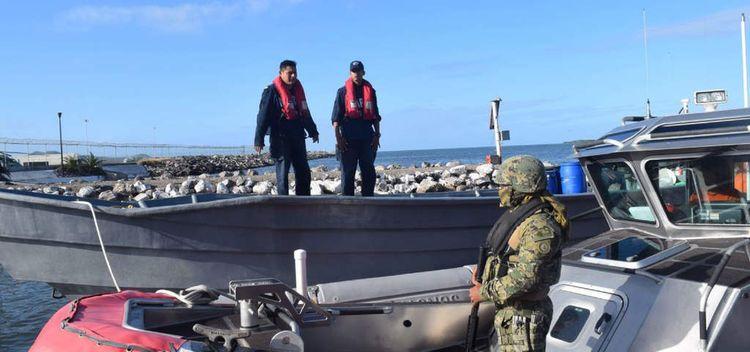In 2020, fishing in Mexico has faced major challenges in the context of a health and economic crisis
unprecedented in our recent history. This has further highlighted the deficiencies that were already present
years ago in fisheries management. An issue of great concern is illegal fishing, in the face of
government institutions that are increasingly limited in operational capacity and a severe economic crisis where fishing illegally can
be one of the most immediate exits for many people living in coastal areas of the country.
As a
thermometer of what is happening in this area, the number of citizen complaints for illegal fishing
made in the first months of the health emergency can be used. According to data from the National Aquaculture
and Fisheries Commission (CONAPESCA), there were 238 complaints between March and May 2020, when health contingency
measures had already been implemented, compared to 166 in the same period in 2019. An increase of 43%.
What happens with citizen complaints helps us to give us an idea of the magnitude of the increase in
illegal fishing during the pandemic. It must be considered that there are many more illegal acts that cannot be detected and reported.
However, given this, the capacity of the Mexican State to regulate and care for its fisheries has historically
been limited and is even more so now. Our marine territory is more than 3.1 million km2, and the
terrestrial territory another 1.9 million km2. Currently, CONAPESCA, the institution responsible for regulating the country's
fishing activity, has 156 people dedicated to fishing surveillance activities on land and sea. Given the
extent of what they have to regulate, their number is extremely small.
In 2020, CONAPESCA
also suffered a significant reduction in the budget for carrying out inspection and surveillance tasks. According to data from
CONAPESCA, in 2019, the institution had 152.8 million
pesos to carry out operating expenses in this area, including resources for paying for fuel, land tickets, travel expenses, and other items necessary for the operation.
This year, there are only 45.3 million pesos. We are talking about a cut of more than
70% in the budget required to fulfill this important responsibility 2.
In the past, one way
to address this State's inability to control illegal fishing was greater involvement of fishing
communities and organizations. CONAPESCA provided support to fishing organizations to carry out everything
from campaigns against illegal fishing to covering the operating, maintenance and operation of
inspection and surveillance equipment. In 2018, support was provided under this category for 63.2 million pesos.
However, starting in 2019, these supports were canceled 3. Consequently, this collaboration with
communities has also been limited in the midst of the pandemic and the severe economic crisis.

Even in this scenario, the analyses found in the Fisheries
Inspection and Surveillance Effectiveness Index developed by Causa Natura and also available on the Fishing Data platform,
suggest that, in the comparison between states, there are some that do things better than others in this area. This
may be related to collaboration with fishing organizations and working together with
state governments, and not necessarily to a greater allocation of personnel and resources. For example, this could explain the
better score in the index by Yucatán, a state that, without being one of those with the largest resources, has
been able to perform the second best nationally in the years 2019 and 2020.
Simultaneously with the
reduction of CONAPESCA's budget, there is an intention from the federal government for the Secretariat of the
Navy (SEMAR) to assume a more prominent role in the fight against illegal fishing, following a tendency to
militarize tasks of the federal public administration. In this regard, since 2019, CONAPESCA mentioned SEMAR's
greater involvement in the fight against illegal fishing, which included the signing of a
coordination agreement between SADER and SEMAR so that a total of 70 members of the latter could carry out inspection
and surveillance tasks in the marine area and freshwater bodies of the national territory 4. There is currently an initiative to
reform the General Law on Sustainable Fisheries and Aquaculture by Morena deputies that transfers much of the responsibility for combating illegal fishing from CONAPESCA to SEMAR, to finish formalizing this transition.
5
Although having the greater involvement of SEMAR can help address this
limitation of resources and capacities on the part of CONAPESCA, it is imperative that its role be very clearly defined
in the legal framework. Powers and responsibilities must be well defined, and, especially, this must be accompanied
by a policy of respect for human rights and transparency in all the work that is done, which must
be reflected in the bill currently under discussion in the Chamber of Deputies. Also, not
everything has to do with greater access to resources, another part involves better collaboration between different levels of
government and the fishing sector itself. It will be important to analyze what is working best in
the different states of the country, as well as to strengthen support for fishing organizations and other interested actors so that they can
join current efforts to solve this problem that afflicts fishing activity.
Appointments:
1 See Data Fishing, Combating Illegal Fishing. Available at https://pescandodatos.org/combate-a-la-pesca-ilegal
2 See Budgetary Transparency.
Budget 2019 [presupuesto_mexico__2019.csv] https://www.transparenciapresupuestaria.gob.mx/es/PTP/datos_presupuestarios_abiertos and
Budget 2020 [presupuesto_mexico__2020.csv] https://www.transparenciapresupuestaria.gob.mx/es/PTP/datos_presupuestarios_abiertos
3
See Fish Data, Fishing Subsidies. Available at https://pescandodatos.org/subsidios-pesqueros
4 El Universal, “Semar joins surveillance
tasks to combat illegal fishing”, 20/04/2019. Available at https://www.eluniversal.com.mx/nacion/sociedad/semar-se-incorpora-tareas-de-vigilancia-para-combatir-pesca-ilegal
5
See http://gaceta.diputados.gob.mx/Gaceta/64/2020/mar/20200319-II.html#Iniciativa8



Comentarios (0)